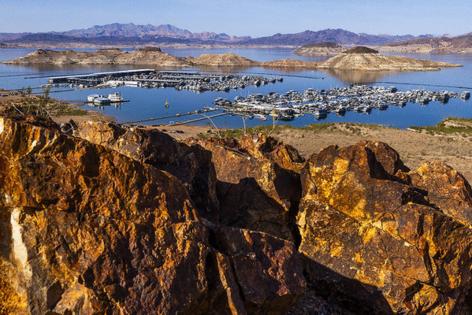States poised to blow past Colorado River deadline without a deal. Here's what we know
Published in News & Features
LAS VEGAS — It’s coming down to the wire for the seven Colorado River states to comply with a federal deadline to submit a plan for how to divvy up the river over the next 20 years.
The contentious, closed-door process has been drawn out over multiple years as the outlook for levels at Lake Mead and Lake Powell continue to nosedive. But the states seem poised to miss Tuesday’s deadline from the Trump administration’s Interior Department, ushering in a more possible scenario in which the feds could intervene and progress could be delayed by a lengthy court battle.
All seven states are meeting Tuesday, said Bronson Mack, a spokesman for the Southern Nevada Water Authority. The agency’s general manager, John Entsminger, is Nevada’s governor-appointed negotiator.
The major sticking point has been a fundamental disagreement in whether further cuts in water use should come from the Lower Basin states of Nevada, Arizona and California alone.
The Upper Basin states of Colorado, Utah, New Mexico and Wyoming have argued they would not agree to more cuts because they already are taking them due to climate change and declining snowpack. Some nongovernmental organization leaders have called out Upper Basin officials for attempting to divert more water from the river through proposing new dams and reservoirs.
A potential solution came in June in the form of a proposal to base releases downstream on a three-year average of natural flows at Lees Ferry in Arizona. Details are murky about whether that’s still being considered on Tuesday.
Ripple effects
What happens in the negotiating room has ripple effects for the estimated 40 million people who depend on the Colorado River for their water supply, including seven U.S. states, 30 Native American tribes and parts of northern Mexico. About 90% of Las Vegas’ water comes from Lake Mead.
Michael Sakas, a spokesperson for Becky Mitchell, the state of Colorado’s Upper Colorado River commissioner, said in a statement that the Upper Basin states are “fully participating and ready to do their part in any agreement.”
Mitchell has said she would not sign on to any agreement that creates a set delivery obligation to the Lower Basin.
More updates are forthcoming “when there’s substantive progress to report,” Sakas added.
The leadership guiding the Colorado River process over the years has changed quite a bit, too.
Most recently, the Trump administration’s nominee for commissioner of Bureau of Reclamation — an Arizonan — alleged the fight between the basins politicized his nomination, forcing him to withdraw because of an appearance of bias toward the Lower Basin. Scott Cameron, a senior adviser to Interior Secretary Doug Burgum, has since taken the helm of the Bureau of Reclamation as acting commissioner.
_____
©2025 Las Vegas Review-Journal. Visit reviewjournal.com.. Distributed by Tribune Content Agency, LLC.







Comments